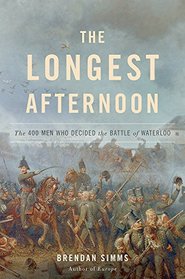Sir Arthur Wellesley, Duke of Wellington, once said the the Allied army's victory at the Battle of Waterloo was a "near run thing." This book backs him up. And the author's premise is if it hadn't been for the 400 or so men of the Second Light Battalion of the King's German Legion, the battle might very well have been a victory for Napoleon's French Army.
The Second Light Battalion held a farmhouse throughout the entire day's battle, taking heavy casualties and retreating only after running out of ammunition. Not only did they draw the attention of large units in Napoleon's army, they also held up the French advance for most of the day, allowing the Prussian Army to arrive on the scene and clinch the victory.
These men were mainly from the German Electorate of Hanover, which Napoleon had dissolved. But a number of the men were from other German states, as well as other regions. Both German and English were spoken in the King's German Legion. Why did it have that name? Well, most people don't know that the British King, George III, was also the desposed Elector of Hanover. Yes, the British royal family was originally from Germany. At the beginning of World War I, they had to anglicize their name.
For several reasons the author lists at the end, the efforts of the King's German Legion was 'overlooked,' not only after the battle, but even until today. As such it makes for a very interesting story. The text is only about 130 pages, so it is a quick read.
The Second Light Battalion held a farmhouse throughout the entire day's battle, taking heavy casualties and retreating only after running out of ammunition. Not only did they draw the attention of large units in Napoleon's army, they also held up the French advance for most of the day, allowing the Prussian Army to arrive on the scene and clinch the victory.
These men were mainly from the German Electorate of Hanover, which Napoleon had dissolved. But a number of the men were from other German states, as well as other regions. Both German and English were spoken in the King's German Legion. Why did it have that name? Well, most people don't know that the British King, George III, was also the desposed Elector of Hanover. Yes, the British royal family was originally from Germany. At the beginning of World War I, they had to anglicize their name.
For several reasons the author lists at the end, the efforts of the King's German Legion was 'overlooked,' not only after the battle, but even until today. As such it makes for a very interesting story. The text is only about 130 pages, so it is a quick read.




